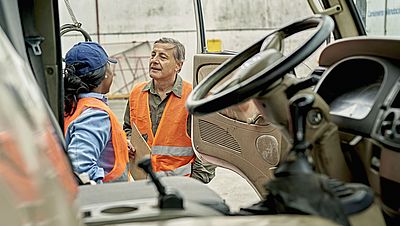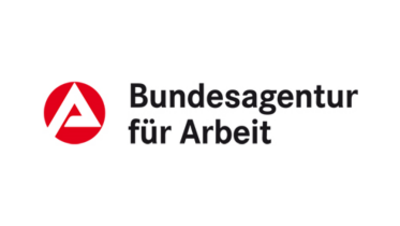
Careers in transport
Do you enjoy travelling, especially in your daily work? Whether trains, HGVs or ships are your preferred mode, join the German transport sector!
On this page
- These professions are in demand in the transport industry
- Becoming a train driver: Requirements and opportunities
- Working in shipping: your options
- Visa for transport professions: What you should know
- Is it necessary to have your qualifications recognised?
- Your guide to a profession in transport: the next steps
Why transport professions have a future in Germany
Germany lies at the heart of Europe and has, by global standards, a very well-developed infrastructure – ideal conditions for transporting goods and people.
Why is this sector important to Germany? Logistics is one of the country’s largest economic sectors. Several thousand transport requests are met daily in Germany.
The majority of goods are currently transported by heavy goods vehicle (HGV). Next comes rail transport, followed by maritime shipping and inland navigation. The German economy is highly dependent on qualified drivers for all transport routes – but not only for transporting freight.
Passenger transport is also of great importance for the German economy and society. Figures show that in Germany, the number of people using local public transport has never been as high as it is today. Germany’s transport transition – the shift towards a decarbonised transport system – is alone expected to result in a one-third increase in the use of buses and trains in local public transport by 2030. We need qualified staff to operate these vehicles.
Transport in Germany: figures at a glance
These professions are in demand in the transport industry
Professional driver
Are you an expert HGV or bus driver, do you enjoy taking on responsibility, and are you always keen to learn new things? Then Germany is the right place for you to work! You can expect a modern workplace in your role as a professional driver. Automation technology is constantly evolving: vehicles are becoming ever safer, and work is underway to develop alternative vehicle powertrains.
You are needed! The industry has a high demand for professional drivers. In 2023, there was a shortage of more than 70,000 professional drivers in Germany, with many new positions becoming vacant each year. This is the career opportunity you have been waiting for.
This is what you can expect:
- A job with a future: road transport is by far the most important mode of freight transport. There are many job openings with long-term prospects.
- Safety: all professional drivers undergo further training every five years, contributing to increased safety in road freight transport.
- A diverse working environment: even now, 39% of employees in this profession are non-German nationals.
How can I work as a professional driver in Germany?
Special conditions apply for those seeking to immigrate to Germany for the purpose of working as a professional driver.
To start working as a professional driver,
- you must hold a category C1, C1E, C, CE, D1, D1E, D or DE driving licence issued by the EU or the EEA, and
- you must be able to provide evidence of your EU or EEA initial qualification to drive vehicles in the relevant driving licence category.
What if I do not possess an EU or EEA driving licence or the EU or EEA initial qualification yet? Under certain conditions, you can still immigrate to Germany and obtain your driving licence and initial qualification here. For more information on this special legal regulation, please refer to “Special regulations for professional drivers” in the “Visa” section.
Do you have a driving licence from another country? Either your driving licence will be recognised in Germany or exchanged for a domestic licence, or you will need to take your driving licence test again. This depends on the country where your driving licence was issued. This matter is regulated by the Ordinance on the Admission of Persons to Road Traffic (FeV). For some countries, there is a simplified process for exchanging a driving licence from a non-EU/EEA country for a German driving licence. Regarding this, please refer to the Fact Sheet issued by the German Federal Ministry for Digital and Transport (External link) .
Training as professional driver
Would you like to become a professional driver, but have no experience in this field as yet? Apprentices are also in demand! Find out more in the “Training in Germany” section.
Becoming a train driver: Requirements and opportunities
The railways play a key role in sustainable freight transport and as a means of public transport for passengers. The importance of rail transport will continue to grow in the future – and with it, the need for skilled workers.
Train drivers (other designations in German: Schienenfahrzeugführer, Triebfahrzeugführer im Eisenbahnverkehr, Eisenbahner im Betriebsdienst) ensure that goods and passengers reach their destination safely. Even as a qualified skilled worker, there is still a lot you can learn. After all, digitalisation and automation mean that the tasks performed by train drivers are also changing.
Training as train driver
Do you aspire to be a qualified skilled worker, and are interested in a paid apprenticeship to become a train driver in Germany? You can also find information on training to become a train operator on our portal.
Drivers needed in public transportation
Your job is to drive buses, underground trains or trams? There is also an urgent need for drivers in the public transport sector! Look for vacancies in your field in the job listings.
Working in shipping: your options
Inland navigation vessels play an important role in sustainable freight transport, alongside railways, because they are an environmentally friendly mode of transport. In response to the transport transition and the need to decarbonise freight transport, inland navigation is expected to increase significantly as a percentage of the goods transported in Germany over the next few years. Another advantage is that a single ship is capable of replacing a large number of HGVs, making it a highly effective mode of transport.
To operate not only inland waterway but also global maritime transport services, Germany needs qualified skilled workers to be able to secure its position as a business location in the long term. After all, Germany is a leading export nation – and seagoing vessels transport around 90% of the global movement of goods. The following professions are examples of occupations in the German shipping industry:
- Inland Bargewoman / Inland Bargeman
- Inland Shipping Captain
- Port Logistics Specialist
- Port Boatwoman / Port Boatman
- Nautical Officer Assistant
- Ship Mechanic
- Technical Officer Assistant
Here (External link) you can find interesting facts about inland shipping and information about a career in the industry (available in German).
Training in the shipping industry
Are you interested in shipping and would like to learn a profession in Germany? Visit our portal to find out more about training in Germany; for information on maritime shipping, please go to deutsche-flagge.de (External link) .

Visa for transport professions: What you should know
As a citizen of the European Union, Liechtenstein, Iceland, Norway or Switzerland, you do not need a visa or residence permit to work in Germany. Citizens of other countries do require a residence permit for this purpose. Please refer to the “Visa” section to find out more about the work visa for qualified professionals.
Job-seeking in Germany with completed vocational training
Under certain conditions, you may also enter Germany for up to one year after completing your vocational training to look for a job. You can find more information in the “Job search opportunity card” section.
Is it necessary to have your qualifications recognised?
If you are from a non-EU country and need a visa or residence permit for Germany, your qualifications will usually need to be recognised. In fact, it is easier for employers to assess jobseekers’ qualifications if they have been recognised.
If you have a non-academic vocational qualification, you will need to undergo the recognition procedure. More information on this topic is available on the Anerkennung in Deutschland (External link) portal for the recognition of foreign non-academic vocational qualifications.
If you have an academic qualification, the Central Office for Foreign Education (ZAB) is responsible for assessing your degree. For more information, please refer to our “Academic qualifications” section.
Our “Recognition” section provides you with more information on the recognition procedure and the comparability of foreign academic qualifications.
Special regulation for professional drivers from non-EU countries
If you are from a non-EU country and enter Germany via the "Special regulations for professional drivers", you may, under certain conditions, enter the country without recognition and without a formal non-academic vocational qualification.
How recognition works in the maritime sector
Do you need more details about your individual recognition procedure? Use the information on recognition in various shipping careers on the “Anerkennung in Deutschland” portal in their "Working in inland shipping or maritime shipping (External link) " section. Select your profession from the list and go through the Recognition Finder step by step – you will be guided through the portal. There you will find out, for example, whether your profession is regulated, whether you meet the requirements for recognition, where you can get advice, which recognition body is responsible, and which documents you need.
The legal basis for the recognition of qualifications in inland navigation is Directive (EU) 2017/2397 (External link) ; for maritime shipping it is the STCW (External link) Convention (International Convention on Standards of Training, Certification and Watchkeeping for Seafarers).
The “Deutsche Flagge (External link) “ website offered by the Federal Ministry for Digital and Transport provides more information on the recognition of foreign certificates (External link) in maritime shipping, contact details (External link) , a service hotline (External link) , and many other options.

Your guide to a profession in transport: the next steps
✔ Your career prospects: with our Quick-Check, you can find out about the opportunities available to you for working and living in Germany.
✔ The German labour market: find more information on job-hunting and get useful tips in our “Looking for a job” section.
✔ Apply now: find a suitable position in our “Make it in Germany” job listings and use our tips for a successful job application in Germany.
Information on the web
- Bundesvereinigung Logistik (BVL) Facts, figures & data on the German logistics industry
- Deutsche Flagge Everything you need to know about the shipping industry
- NETZWERK Unternehmen integrieren Flüchtlinge Vocabulary pamphlet for professional drivers (in English, Spanish, French, Portuguese)
Do you have any questions?
Let us advise you on your opportunities to work and live in Germany. Our experts will support you with questions regarding job search, visa, recognition and learning German.
You can find out more about the various contact options by clicking on one of the icons in the bar below.



![[Translate to English:] Erklärvideo: Wie finde ich einen Job in Deutschland?](/typo3temp/assets/_processed_/2/c/csm_youtube_b272f4eca24cc896849827904109b23e_d3bea852bb.jpg)

